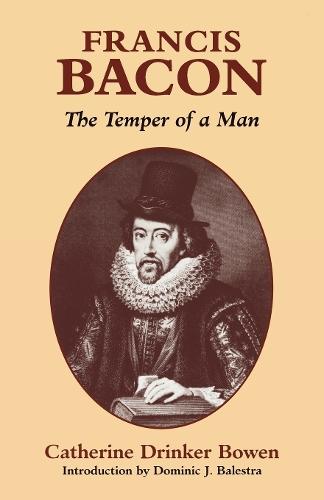Overview
The portrait Bowen paints of this controversial man, Francis Bacon (1561-1626), balances the outward life and actions of Bacon with the seemingly contradictory aspects of his refined philosophical reflections. When Bacon's more notorious attributes are set in historical context, his actions seem less personally vindictive against the backdrop of an entire age seemingly devoted to the very vanity and ingenuousness with which he is so often accused. As Lord Chancellor of England, Bacon was impeached by Parliament for taking bribes in office, convicted, and banished from London an the law courts. In a prayer Bacon composed during the interval following his punishment, he reveals that the dichotomy of his existence was no more deeply felt than by himself, and he readily admits that his obligations to society were not as suited to his nature as the study of philosophy, science and law. Modem scholars hold Bacon's philosophical works, ""Novum Organum"", ""Advancement of Learning"" and ""New Atlantis"" as his greatest achievements. Bowen's story reveals a man whose genius it was not to immerse himself in the rigour of scientific experimentation, but to realise what questions science should ask, and thereby reach beyond the status quo and appeal to the wider imagination of his generation. In his writings, Bacon challenged established social and religious orders, raised questions about mind/body relation and the role of dreams, and foresaw the day when scientists at colleges and universities would share experimentation. It is Bacon's legacy to have gone beyond his age and, out of pure intuition, anticipate the concerns of future generations.
Full Product Details
Author: Catherine Drinker Bowen ,
Dominic Balestra (Professor of Philosophy, Fordham University, USA)
Publisher: Fordham University Press
Imprint: Fordham University Press
Edition: 2nd
Dimensions:
Width: 14.00cm
, Height: 2.40cm
, Length: 21.60cm
Weight: 0.553kg
ISBN: 9780823215379
ISBN 10: 0823215377
Pages: 277
Publication Date: 01 January 1993
Audience:
General/trade
,
General
Format: Hardback
Publisher's Status: Active
Availability: In Print

This item will be ordered in for you from one of our suppliers. Upon receipt, we will promptly dispatch it out to you. For in store availability, please contact us.
Reviews
When Mrs. Bowen was immersed in The Lion and the Throne, she became fascinated with the mercurial greatness of Francis Bacon, great enemy of her subject Sir Edward Coke, and determined to turn to him for further revelation. Here is, in her words, an invitation to Francis Bacon , an evocation, written in chapters that are essentially essays of opinion, lifting the curtain on the five acts of his life played on a brilliant stage. It was seemingly set for him at birth. Born the favorite and youngest son of a favored Lord Chancellor, Bacon looked with some confidence to Elizabeth for position. He left the richness of Gorhambury House for the scholastic aridity of Cambridge, just past great days, then at 15 went to France with Sir Amias Poulet as a toward young man. In 1579 all changed. His father died, leaving him 300 pounds a year. He was poor. Then began the struggle to rise which would eat up 27 years of his life, but would never sway him from his dual, warring ambitions of understanding and will. Studying for the bar at Gray's Inn, at 24 he set forth the fundamentals of his Instauratio Magna: he envisioned an English Golden Age of learning founded upon a study of things, of the observable facts of earth and sky - the philosophy that would sound forth in New Atlantis, Novum Organum. His hopes for high place did not materialize until Elizabeth passed: he, although wishing to serve, had stood against her in Parliament, had allied himself, when his powerful cousins, the Cecils, had turned a deaf ear, with the later notoriously repudiated Essex. Under James I he became Solicitor General, downed Coke, gained the Lord Chancellorship, only to submit to charges put by Commons of corruption. A last noble five years released a spate of the writing he felt was his first calling for all his ??ealings with the world ( The virtue of adversity is fortitude ). Quickwitted as ??efits its subject, high-minded, dartingly penetrating, learned and with a suitably graceful turn of phrase, this is an enriching reading experience that quickens interest in a fascinating man, a thinker of power and the far-reaching intellect to touch us today. (Kirkus Reviews)



